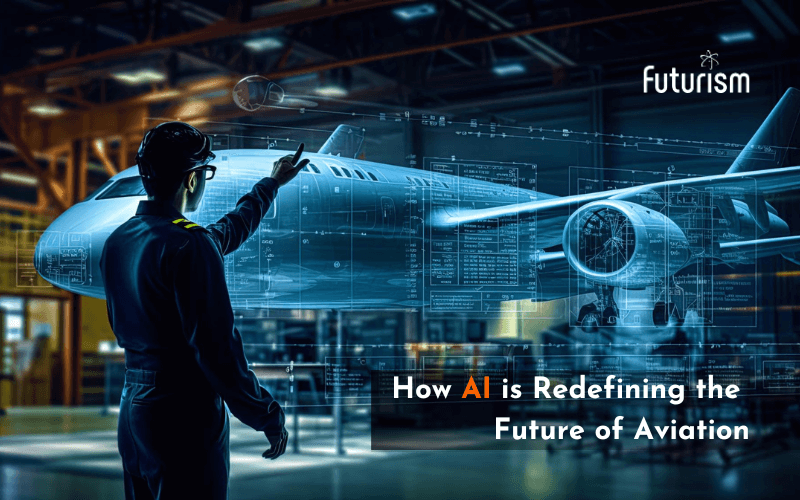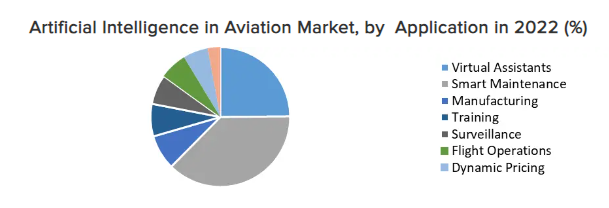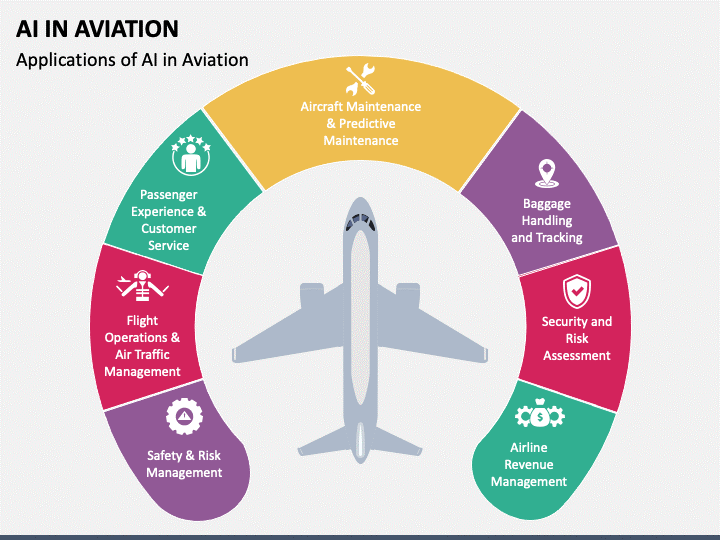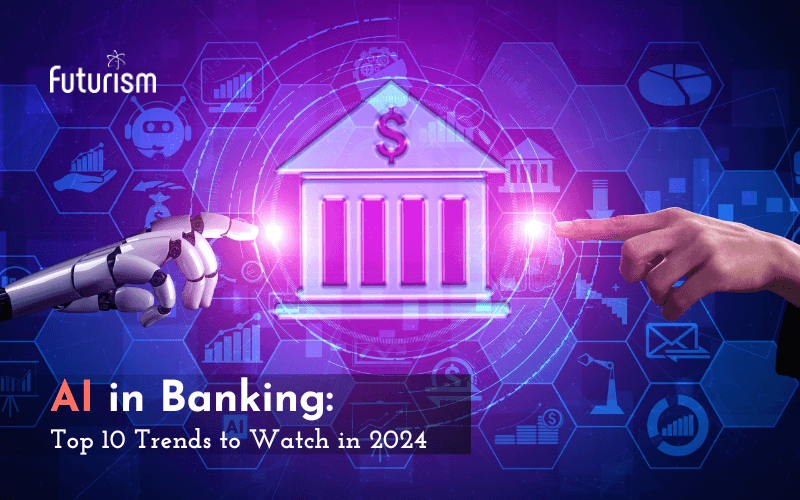Flying into the Future: How AI is Redefining the Future of Aviation

Futurism Technologies
January 30, 2024 - 2.2K
5 Min Read
Across all kinds of industries, cutting-edge technology is revolutionizing operations, and the aviation industry is no exception. Artificial Intelligence (AI) is playing a starring role in this revolution, with companies like Futurism Technologies leading the charge through AI-powered software solutions. This article delves into how AI is reshaping the way we fly, making aviation safer, smoother, and more connected than ever before. By enhancing various facets of aviation – from optimizing flight paths and predictive maintenance to personalizing passenger experiences and streamlining supply chain management – AI is revolutionizing every aspect of air travel.
Forget about sci-fi movies – AI is already making a real impact. We’re talking about optimized flight paths that dodge delays, smarter maintenance that keeps planes in top-notch condition, and even personalized in-flight experiences that feel almost magical. It’s not just about advanced gadgets; AI is enabling airlines and airports to operate like well-oiled machines, reducing costs and making the entire travel experience less stressful for everyone. This is just the beginning, of course. The future of aviation with AI is brimming with possibilities, from drone-powered deliveries to autonomous flying taxis.

• Enhanced Safety Measures
One of the primary focuses of AI in aviation is enhancing safety measures. By incorporating machine learning algorithms and predictive analytics, airlines can analyze vast amounts of data in real-time, identifying potential safety hazards and addressing them proactively. For example, AI systems have been instrumental in enhancing weather prediction models, allowing pilots to avoid turbulent areas, thereby significantly reducing the risk of weather-related incidents. Additionally, AI-driven systems in aviation have been deployed in monitoring aircraft health, leading to the early detection of issues such as engine anomalies or system malfunctions before they pose a risk during flight.
AI in aviation also plays a crucial role in improving air traffic management. Advanced AI algorithms enable precise route planning, minimizing congestion, and optimizing air traffic flow. This is not only a safety enhancement but also a sustainability effort, as it contributes to reduced fuel consumption and lower emissions. A notable instance is the use of AI in managing airport ground operations, where algorithms schedule and manage movements of aircrafts on the ground, reducing the risks of runway congestion and optimizing flights.
• Predictive Maintenance
AI-driven predictive maintenance is revolutionizing the aviation industry’s approach to equipment upkeep. Replacing traditional maintenance schedules, intelligent AI systems in aviation now analyze historical data, sensor inputs, and performance metrics to predict when components are likely to fail. This technological shift not only minimizes downtime but also considerably reduces operational costs for airlines. For instance, a study by the World Economic Forum indicated that predictive maintenance could reduce maintenance costs by up to 30%, while simultaneously decreasing unplanned maintenance by approximately 35%. These solutions ensure airlines can address potential issues before they escalate, significantly improving overall fleet reliability and safety.

Such advancements have profound implications. For example, by predicting the wear and tear on engine components, airlines can save millions annually in maintenance costs. This proactive approach to maintenance, enabled by AI in aviation, is setting new standards in the airlines industry, optimizing the lifecycle of aircraft parts, and ensuring higher levels of safety and reliability in operations.
Read also: How AI and IoT is Enabling Predictive Maintenance
• Smart Cockpits and Autonomy
The integration of AI in aviation is evident in the development of smart cockpits and autonomous systems. AI algorithms, combined with advanced sensors and cameras, enable aircrafts to perceive and respond to their environment in real-time. This technology enhances pilot decision-making processes and augments their capabilities, particularly in challenging weather conditions or complex airspaces. Such innovations will not only make flying safer but also reduce the workload on pilots, allowing them to focus on critical decision-making.
• Personalized Passenger Experiences
AI is revolutionizing the passenger experience in aviation, tailoring every aspect of the journey to individual preferences. For example, AI algorithms analyze passenger data to offer personalized in-flight entertainment selections based on past choices and preferences. Imagine boarding a flight and finding a curated playlist of your favorite movies and music, all thanks to AI’s predictive analysis.
Moreover, AI extends its personalization to meal services. Airlines using AI can analyze past meal choices of passengers and suggest meal options even before they board the flight. For instance, a passenger who frequently chooses vegetarian meals might be offered a new gourmet vegetarian option, enhancing their in-flight dining experience.
Beyond entertainment and meals, AI-powered chatbots and virtual assistants play a pivotal role in customer service. These AI systems offer real-time assistance, from answering queries about flight status to helping with last-minute changes in bookings. An example of this in action is KLM Royal Dutch Airlines’ chatbot, which provides passengers with boarding passes, gate updates, and even baggage carousel information at their destination.
Personalization also extends to the physical comfort of passengers. Some airlines are exploring AI-driven systems that adjust cabin conditions, like temperature and lighting, based on passenger comfort preferences, creating a more pleasant and customized travel environment.
See how Smart Lighting Solutions are Driving Passenger Experiences at Airports
• Efficient Supply Chain Management
Behind the scenes, AI is optimizing supply chain management in the aviation industry. From inventory management to logistics, AI algorithms analyze historical data and predict future demands, enabling airlines and manufacturers to streamline operations and reduce costs.
For instance, Airbus has implemented an AI-based system to optimize its supply chain and production process. This system collects and analyzes vast amounts of data from various sources, including aircraft in operation and manufacturing processes. By doing so, the AI system can predict parts demand more accurately, streamline inventory levels, and reduce the risk of overstocking or shortages. This has led to a more efficient production flow and a reduction in delays for aircraft delivery, ultimately contributing to cost savings and increased customer satisfaction.
Furthermore, AI technologies are being used to manage and optimize the logistics of aircraft parts. AI-driven tools assist in determining the most efficient routes and methods for transporting parts, considering factors like weather, traffic, and cost. This not only speeds up the delivery process but also contributes to environmental sustainability by minimizing fuel consumption and emissions associated with transportation.
• Security and Fraud Detection
In today’s digital age, where cybersecurity is a top priority, AI is playing an essential role in safeguarding aviation systems. Advanced AI algorithms are adept at detecting and thwarting cyber threats, thus ensuring the integrity and security of critical aviation infrastructure.
A notable example of AI’s efficacy in security was demonstrated when an AI system at a major international airport identified a sophisticated cyber-attack on its flight information control system. The AI system, using anomaly and fraud detection algorithms, quickly noticed irregular network traffic patterns and isolated the affected systems, preventing the spread of the attack. This rapid response averted potential flight delays and compromised passenger data, illustrating AI’s critical role in maintaining operational continuity and protecting sensitive information.
AI in aviation is extensively used in fraud detection systems. These AI-driven cybersecurity systems safeguard financial transactions and prevent unauthorized access to sensitive data, which is paramount in an industry handling vast amounts of personal and financial information. For instance, an airline company that has implemented an AI-based fraud detection solution can flag unusual booking patterns, effectively preventing a significant financial fraud attempt.
Takeaway
Futurism Technologies is committed to transforming the aviation industry through innovative AI and Digital Transformation solutions. Recognizing the dynamic landscape of aviation, we are dedicated to developing AI solutions that not only meet the current needs of the industry but also anticipate and address future challenges. Our forward-thinking AI experts are at the forefront of designing and implementing cutting-edge solutions such as predictive maintenance systems that enhance operational efficiency and smart cockpit solutions that redefine the pilot’s role.
We believe in a future where AI not only improves safety measures and operational processes for the aviation businesses, but also creates personalized and seamless experiences for passengers. Our digital transformation solutions for aviation/aerospace and defense industry are tailored to optimize every aspect of the aviation ecosystem, from supply chain management to cybersecurity and maintenance to passenger experience. As we navigate the skies of tomorrow, Futurism envisions a connected, secure, and sustainable aviation industry, where the power of AI propels us into a new era of air travel.
The future of aviation is unfolding right before our eyes, and it’s being shaped by the transformative power of Artificial Intelligence. At Futurism Technologies, we’re not just observers; we’re pioneers leading this exciting journey.
Ready to be a part of this revolutionary change? Connect with our AI experts now!
Subscribe Now!
TRENDING POSTS
-
Futurism Returns to Hannover Messe 2024: Leading the Charge in Industrial and Digital Transformation
-
The Role of Smart Maritime IoT Solutions in Enhancing Maritime Safety
-
Data Integration Unlocked: From Silos to Strategy for Competitive Success
-
Navigating the Shadows: Understanding Zero-Click Attacks in the Digital Age
-
AI Reimagined: Crafting Next-Gen AI Apps with Expert Fine-Tuning
-
Explore Next-Gen Digital Solutions with Futurism at MWC 2024
-
Futurism Unleashes the Technology of Tomorrow at MWC Barcelona 2024
-
Futurism AI: Turning Ideas into Apps at Lightning-Fast Speed
-
Accelerate AI Across Your Enterprise With Futurism AI
-
Futurism to Address the Biggest Security Challenges at RSS 2022
-
Futurism at SelectUSA 2022: Steering the Next Wave of Businesses
-
Futurism to Uplift the MSP Business Community at the MSP Expo 2022
-
Futurism Sets Out to Address the Biggest Security Challenges at the RSA Conference 2022
-
5 Ways to Prepare Your Business for Digital Transformation
-
4 Ways To Win at Digital Transformation on a Shoestring Budget
-
Futurism: Empowering MSPs at the Channel Partners Conference & Expo 2022
-
Why AI in Digital Marketing is the Next Big Thing?
-
Futurism brings ‘Mobile First Digital Transformation’ to the fore at MWC Barcelona 2022
-
Cybersecurity for Rural Hospitals: How can Rural Hospitals become Cyber Smart?
-
Futurism Empowers Rural Health Care Community at the AHA Rural Health Care Leadership Conference
-
The Biggest Problem With Cybersecurity In Healthcare Sector, And How IBM QRadar Can Fix It?
-
How IBM MaaS360 is Revolutionizing Endpoint Security in the Healthcare Industry?
-
Futurism to Present its MSP Partner Program at the Channel Partners Conference & Expo 2021
-
EndPoint Security in Healthcare Matters and IBM MaaS360 Can Help
-
How AI Will Enable Faster Adaptation of Digital Transformation
-
How Is Digital Modernization Important In Supplier On-Boarding?
-
Top 10 Email Marketing Tips for This Holiday Season
-
Benefits of using ERP Software for Energy and Gas Industries





